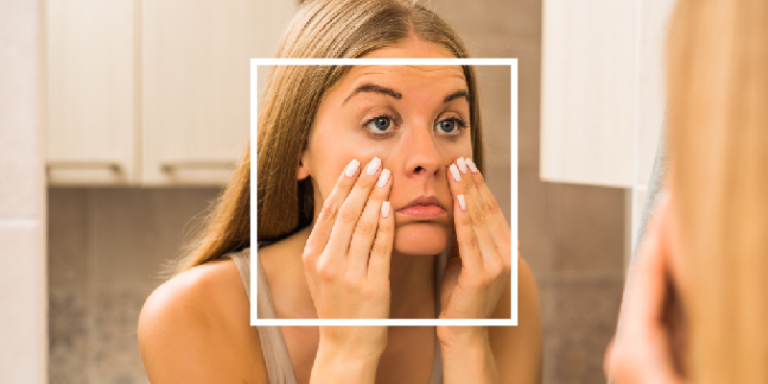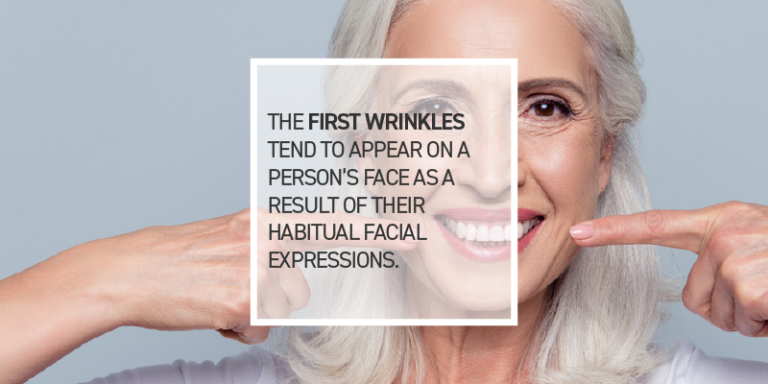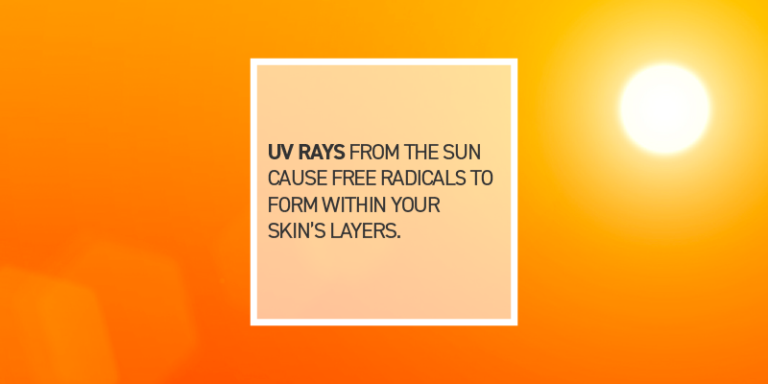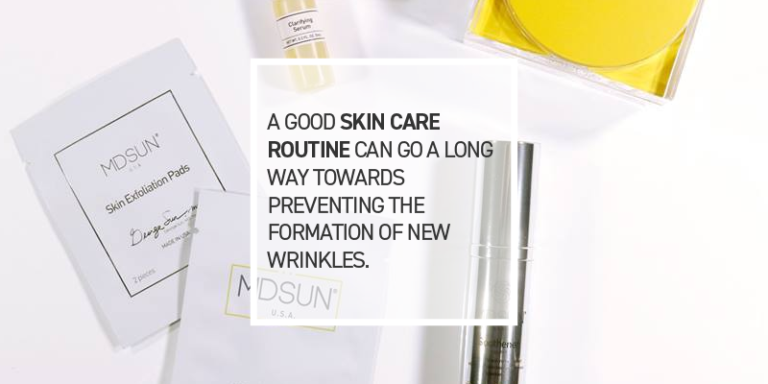Skincare Tips from MDSUN Skin Care®

Have you ever looked at someone and wondered “What are all of those wrinkles from?” Hopefully, it wasn’t your own reflection you were staring at so critically.
Wrinkles can be a part of the natural aging process. But there’s also a lot that you encounter during the course of your life that can lead to premature wrinkles and land you with deeper wrinkles in your later years than you were destined for.
If you know where wrinkles come from, you can take steps to keep them away as long as possible!
Wrinkles and Aging

Some wrinkles are often a part of the natural aging process. The first wrinkles tend to appear on a person’s face as a result of their habitual facial expressions. Since your face repeatedly moves in specific ways when you laugh, smile, frown, or squint, those crinkled areas are the ones prone to forming fine lines and wrinkles over time. There are also other factors that contribute to wrinkle formation.
As people get older, the production of natural oils decreases which has a drying effect. This results in a crepey texture to the skin, and a loss of that healthy plumpness. As a result, the first wrinkles start to become noticeable.
What Contributes to Wrinkle Formation?

Sun damage, smoking, dehydration, some medications, and environmental and genetic factors affect when and where people will develop wrinkles. The good news is that most wrinkles are not attributable to age. There are multiple outside factors that play into what happens on your face. The good news is that you have complete control over most of those factors. All it takes is a little bit of thought on your part and attention to detail.
The Sun
UV rays from the sun cause free radicals to form within your skin’s layers. Sun damage is the most common cause of skin wrinkling. “Sun damage results in loss of collagen and elastin, resulting in wrinkling of the skin,” says Jerome Potozkin, MD, board-certified dermatologist. That holds true for all forms of UV light, including sunbathing, tanning booths, and outdoor sports.
UV light breaks down the collagen and elastin fibers (the skin’s connective, supporting tissue). Breaking down this layer makes the skin weaker and less flexible. The skin will start to droop, and wrinkles will appear.
Pollution
The environment around you has a huge impact on your body as a whole, and on your skin, especially! “Pollution is another environmental factor contributing to free radical damage,” explains Maral K. Skelsey, MD, board-certified dermatologist and Director of the Dermatologic Surgery Center of Washington. A study published in 2010 found that people living in urban settings had more wrinkles and age spots than those living in rural areas.
Smoking
Smoking is a huge contributor to the number of free radicals found in your body’s cells. It’s one of the biggest causes of wrinkles. The position of the cigarette in your mouth creates facial expressions that eventually stay, but the toxins from the cigarette will age your skin way beyond your years. “Nicotine in cigarettes causes narrowing of the blood vessels in the skin, leaving it prone to wrinkling because vital nutrients cannot reach the epidermis,” Skelsey states.
Poor Nutrition
A lack of good nutrition can deprive your body of nutrients that it needs to keep your skin healthy and strong. Not only that, but the overly-processed foods and sugars can lead to further tissue damage. “After the sugar is ingested it goes through a process called glycation, which involves binding to different proteins in our bodies,” Kristia Goldenberg, MD, board-certified dermatologist of Goldenberg Dermatology, explains. “Unfortunately, these proteins include collagen and elastin. But binding to these building blocks of the skin, sugar weakens collagen and elastin and will lead to an appearance of fine lines and wrinkles.” She goes on to note, “Glycation also produces further toxic products that further cause premature aging.”
Not Getting Enough Sleep
During your deepest levels of sleep is when your body replenishes its collagen supply. “That’s part of the repair process,” says Patricia Wexler, MD, a dermatologist in New York. Since collagen is linked to your skin’s elasticity, adequate collagen production leads to plump skin that is less likely to wrinkle and doesn’t appear saggy.
When you don’t get a full night’s sleep, your body doesn’t have the time to produce new, fresh cells to fix yesterday’s damage, so you’re practically welcoming accelerated aging with open arms.
Lack of sleep can lead to dehydrated skin, too, furthering the wrinkle factor. “Lack of sleep contributes [to wrinkles] because the pH of the skin is altered by not sleeping enough and that skin cells’ ability to remain hydrated,” Skelsey explains. “Additionally, it’s during sleep that toxins are flushed from the body.”
Without sleep, your body puts itself in a constant state of stress, releasing excess cortisol, a hormone that is known to cause premature skin aging and wrinkles.
How To Prevent Wrinkles

It should come as no great surprise that your best bet when it comes to avoiding the formation of wrinkles is to avoid the causes that we talked about above. Staying out of the sun when possible and wearing daily sunscreen year-long can really go a long way towards preventing damage that leads to wrinkles. Now’s as good a time as any to quit smoking before it’s too late. Take a good hard look at your diet and make a concerted effort to eat healthy. That includes drinking plenty of water every day.
While generalized facial care is essential to your skin health, washing your face before bed is a crucial step towards removing the pollution particles your face has been subjected to throughout the day. A good skincare routine can go a long way towards preventing the formation of new wrinkles and helping to smooth out and lessen those that already exist. Your regimen should include:
- A gentle cleanser
- A good moisturizer
- A strong anti-aging serum
- Adequate sunscreen
- Mild exfoliation
- A weekly mask
MDSUN offers the best skincare for both preventative care and for aging skin. Their products achieve superior skin-enhancing functions due to their unique proprietary Ultrapack technology. Each product features a custom formulated base, designed with specialized ingredients that provide clinical efficacy and long-term improvement in the look and feel of skin. At the same time, MDSUN products are mild enough for use on sensitive skin over a lifetime.
Skin Care Tips From MDSUN Skin Care®
Please Visit Our Official Website - MDSUN Skin Care




Comments
Post a Comment